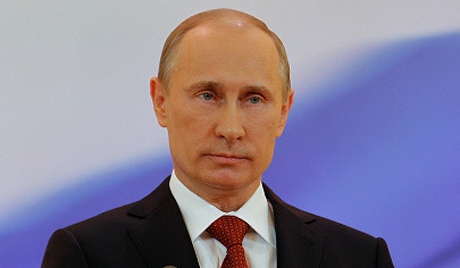
 May 7th marks one year since President Vladimir Putin officially took office as president on May 7th 2012.
May 7th marks one year since President Vladimir Putin officially took office as president on May 7th 2012.Commenting on the results of Putin’s first year in office, experts say the government is taking concerted efforts to secure the implementation of Putin’s election promises and his initiatives on the international scene which are set to consolidate the country’s reputation and build up its image all over the world.
The Voice of Russia’s Ilya Kharlamov reports.
Vladimir Putin outlined the country’s top priorities for the coming years in a clear and unambiguous manner. Russia will support integration in the post-Soviet space, pursue its interests in various regions of the world, guarantee social benefits for the people and ensure the progressive economic development of the country.
According to B of the Center for Political Information, Moscow maintains strong positions in world politics – it is presiding over the G20 and initiates a large number of global development programs in an effort to make the world follow more favorable laws than before.
"The principles for global development proposed by Russia are fair and transparent thereby putting Moscow in the top position among countries that are experiencing a lot of pressure from the EU and the US", Mukhin said.
Russia’s relations with western countries are marred by plans to deploy missile defense bases in Europe and the Magnitsky Act. Moscow is accused of non-compliance with democratic freedoms and is criticized for its positions regarding Syria and Iran.
Russia is against foreign intervention in the Syrian conflict and supports Iran’s right to purse a peaceful nuclear program. A softer stance on Syria would encourage western nations to bring in troops, like in Libya and Iraq.
As Russia pursues a pragmatic policy based on respect and trust, economic ties acquire prime importance in top-level contacts. Analyst Sergei Mikheyev says that integration within the post-Soviet space serves as reliable testimony in favor of such an approach.
Undoubtedly, Putin is the main driving force behind such integration, Mikheyev says. In many of his speeches, he describes the near abroad as Russia’s foreign policy priority. The past year demonstrates that the president is following this agenda to the letter.
In addition to the post-Soviet republics, Russia is expanding ties with countries far beyond. A newly established joint venture between Russia’s Rosneft and Venezuela’s PDVSA will engage in the prospecting, production and sale of oil and gas in Venezuela.
Rosneft has also consolidated 100% of TNK-BP shares, a move that is bound to boost its positions on the market and has softened the position of the British leadership regarding Moscow.
As Russia is quickly expanding its presence in other countries’ energy and infrastructure projects, it is participating in the construction of new NPPs, extraction of mineral resources and building of transport networks.
During one year of his presidency, Putin has managed to maintain the country’s economic and social stability. A statement to this effect was made by Pavel Svyatenkov of the Historical Perspective Foundation.
"The last repercussions of the 2009 crisis are over, and since the country’s economy remains at a fairly good level, the year that has passed since Putin became president has been successful, financially and economically", the expert says.
At present, Russia is facing a number of challenges – it has to create 25 million jobs for qualified personnel and address problems related to its membership in the WTO and the outflow of capital.
Experts predict an increase in investment in the Russian economy over the next few years which they attribute to the government’s measures to improve the country’s business climate. Measures against corruption make a particularly important part of the government’s agenda.
Mikhail Remizov of the Institute of National Strategy says one year of Putin’s presidency has seen a large number of anti-corruption measures.
"Even though all these measures are yet to take effect, the political will to see them through is there", Remizov said.
Reports released at the end of April say 110 of 151 presidential orders and decrees for 2012-2013 have been implemented. However, Vladimir Putin signaled a number of difficulties in connection with the implementation of these decrees during his recent call-in with the nation.
"The difficulties stem from the inertness of the local authorities", he said.
All in all, the president issued 218 orders in a large number of areas, including social and demographic policy, economy, and modernization of the army.
As 67 of these orders are for years ahead, we can sum up only the first results of Putin’s presidency now.



_jpg/250px-ElbeDay1945_(NARA_ww2-121).jpg)





